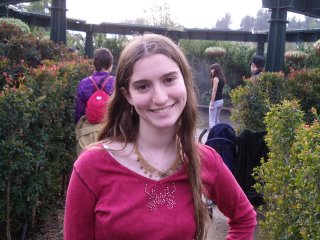Friday, April 28, 2006
Monday, April 24, 2006
More on Open Court
Dr. McNenny mentioned that some scholars and critics accuse Open Court of creating "non-professional teachers." This is probably due to the step-by-step, scripted format of the lesson books. I asked my better half about this, and she agreed (along with Garrity) that there is a whole script, in quotes, of what the teacher should say. However, she also challenged any teacher to actually try and use this script--it is patently ridiculous.
The thing is, if it isn't Open Court, it's going to be another, similar broad-based curriculum. For a district like LA Unified, there has to be some sort of standard between schools. If a first grader learns to read using Open Court, and then transfers to a different school in second grade that uses another reading system, he or she will instantly fall behind. In that way, a standard curriculum in the state-wide public school system has advantages. And whether or not you agree with the methods of evaluation and standardized testing, it is a political reality. Wouldn't it be more effective to evaluate a student population using the same curriculum?
I would challenge any critic of Open Court to actually go into a classroom for a month and watch it being taught. I would put all of my money down that their opinion would change. Much of the criticism has actually come from the teachers' unions, where older teachers were annoyed that they were being forced to adopt a new system.
Open Court has many faults, but any teacher worth their salt is able to separate the good from the bad and personalize the curriculum to best suit their style of teaching as well as their specific group of students. Those teachers who can't shouldn't be teaching at all; thank God there is a scripted curriculum out there, otherwise their students would be left out to dry.
I'm probably sounding very Marxist here, and I'll admit I was totally against this type of forced, broad-based curriculum five years ago. But after experiencing first hand (well, actually second hand) the trauma of inner-city teaching, I think I end up coming down in favor of Open Court, for all its faults.
De-stressing not Distressing
I also love to make to-do lists. Nerdy as that may be, it's also quite helpful. I include as many things as possible on the list that I have to do. Not just my assignments, but also a number of menial tasks (like paying bills, cleaning, writing emails or making phone calls.) All of the menial tasks are things that I know I'm going to get accomplished during the course of the day anyway. Nevertheless, I put them on my list. So, when I take two minutes to pay my phone bill online, I have something to check off the to-do list. The same goes for sending an email or cleaning my room. All of a sudden, I haven't spent much time at all. However, activities are getting checked off the list. So it all seems more manageable.
Sunday, April 23, 2006
Dealing with End-of-the-Semester Stress
One key strategy is to suspend the Critic, activate the Creator, and dive in! Take the inspiration that you want to explore and write as much as you can without being critical of yourself. I think you'll be amazed at how much more you know than you thought you knew! There's also something magical about writing. The act of putting your thoughts on paper helps you figure out what you want to say, and even if you decide to revise what you've written beyond recognition, you've still given yourself a starting place. The other advantage of writing out your thoughts on a required project is that you now have a first draft. Think on paper through outlining. Speculate about how you can develop your paper. Write down questions you need to answer. Keep a running Notes file with a Works Cited page at the end of the file. That way, when you find passages that help you think about your research area, you'll have the citatation and research material already at hand. Share your work with a friend.
What are some strategies you use to cope with all the demands for the end of the semester?
Thursday, April 20, 2006
"Writing Across Borders" Film
How comprehensible is the writing? Is the grammar affecting the message that the student is trying to relate to readers? When it comes to correcting the grammar, how many errors really detract from meaning? It is important to hold international students to the same level as others in terms of quality of meaning and other Higher Order Concerns. It is also important to remember that writing is a process, one that will improve with practice and meaningful, encouraging feedback!
Wednesday, April 19, 2006
Response to Video Shown in Tuesday's Class
Saturday, April 08, 2006
Erica at the Huntington

I've spoken of my daughter Erica in class pretty often, and I thought you might enjoy getting a better idea of what she looks like. I have to say that I have all the failings of a mom. I can't speak highly enough of her and at times my praise can seem out of proportion to the possible. Somehow I was gifted with a daughter who loves to read and write. She is constantly picking up anything she sees and reading it, and she even keeps her own electronic journal every day, that is, when she isn't exhausted from school work. Right now she's reading The Chronicles of Narnia, The Claudie Chronicles, and more recently, a book of criticism on the Harry Potter series entitled Mapping the World of Harry Potter, which is just a great book on various aspects of the books, including chapters like "Harry Potter and the Young Man's Mistake," "Neville Longbottom: The Hero with a Thousand Faces," "Harry Potter and the End of Religion," and "Why Killing Harry Potter Is the Worst Outcome for Voldemort."
Knowing a young person so intimately has changed my understanding of teaching writing. More than ever, the importance of authentic reasons for reading and writing are apparent to me. When a young person actually chooses to pick up a book on literary criticism, that just astonishes me! Just the fact that millions of young readers plough through Rowling's 800-page novels tells us something about the power of appealing to children's imaginations. And then, when they willingly, indeed fanatically, contribute to blogs on Harry Potter and his mates, visiting sites speculating on whether Dumbledore is really dead (see dumbledoresnotdead.com) by the millions, I know there's a hook there--in the mythology and in the psychology of the hero that they identify with so easily.
Have you had the opportunity to interact with and get to know young people in such a way that they've changed the way you see yourself teaching?
Being the Learner as Well as the Teacher
This, to me, is the only viable way to really enjoy teaching, and this goes back to the root of authenticity. Are the questions we ask authentic in their inquiry into unresolved issues? Have we looked for those aspects that go beyond the black and white of right and wrong and instead delve into the truly rhetorical, indeterminate, unresolvable grey areas of real issues?
This is why I like to assign in-class writing prompts and write along with everyone else. I like to share what I've written and read what someone else has written in response to the same question. I like to hear the endless variety of possible responses, especially when I consider the many nuances of their responses.
I know, of course, that there are many levels of comprehension and that content questions confirming students' understanding of the key points made in a text and various methods for ascertaining students' grasp of the material are necessary. Still, we need to be able to prepare for our classes with genuine wonder in the questions that we pose to our students.
What about you? Have you experienced classes where inquiry was more than just a way of checking to make sure your comprehension of subject matter matched that of the instructor? Have you worked with an instructor who really challenged you to think and made the opportunity to find out about a new topic an occasion for authentic discovery?
Inside the Huntington Gardens
Friday, April 07, 2006
Grammar as a Lived Experience
These are all valid. The lover of the French language who thereby discovers and better understands the underlying linguistic system of English knows that the experience of learning French unlocked an awareness of language that would not have been there otherwise. Learning to speak and write a language different from our own really teaches us a lot about language, and by doing so, we gain a whole new understanding of language. The key point here, though, is that linguistic awareness was gained through actually trying to speak and write in the target language. Thus, the writer learned language through the agency of communicative competence-an active effort to communicate meaningfully in the target language. Stephen Krashen and other linguists would tell us that this is the key: grammar is learned best in situations in which the writer engages in meaning-making--writing or talking for real audiences and purposes.
At the same time, we have decades of studies that carefully track the impact of grammar instruction and its impact on writing proficiency. In one study, students who studied grammar over an entire year with an increasing emphasis on correctness ended up writing more poorly than they did at the beginning of the year. Their obsession with correctness discouraged them from taking risks in writing. As a result, their writing became more labored and monotonous. In effect, it was worse. Does an overemphasis on grammar simply encourage our students to play it safe and to equate good writing with correct grammatical structure? Does it create risk-averse writers?
I also wonder about the other experiences that people have with grammar instruction that have an impact on their writing. What are some of the experiences you've had with grammar? What impact do you see grammar having on your ability to write? Has a foundational understanding of grammar--of the key features of language structure and usage, as noted in Kelli's handout on Thursday--played a key role in your writing?
Welcome to The Writers' Cafe Blog
Some of the questions we can explore include the following:
- What goes into being a good teacher?
- What attitudes toward teaching will carry you forward in ways that make teaching a pleasure and a meaningful pursuit throughout your career?
- How can we resolve the many different perspectives on grammar and the teaching of writing that we hear in our class from various class members?
This will be a space in which to share our views on these issues as well as a place to share resources for and approaches to the teaching of writing. So please feel free to contribute and to share your thoughts on any issues that strike you as we continue to study writing theory and pedagogy. Let the games commence!

